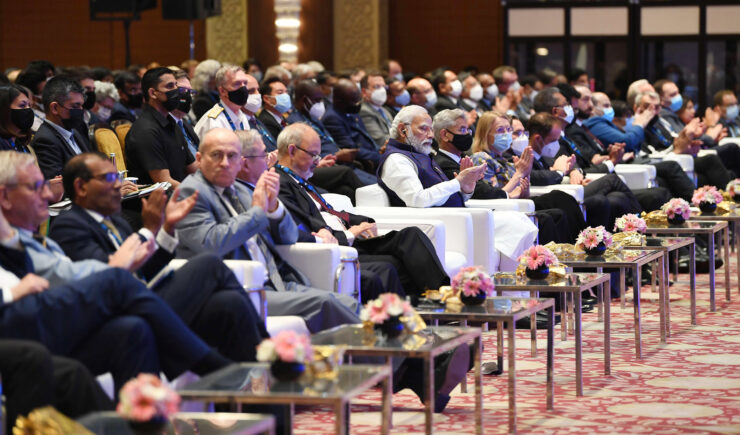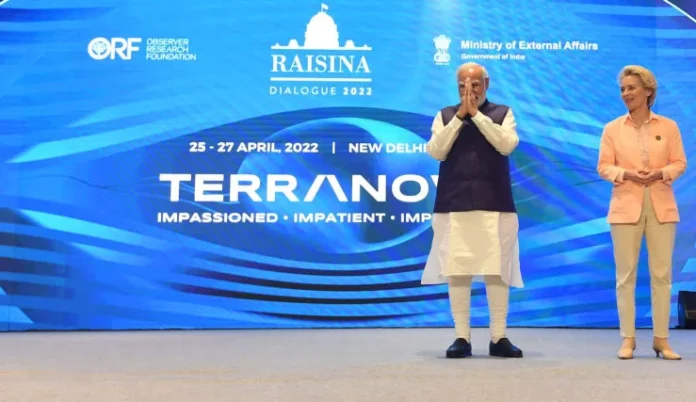One of key takeaways of the three-day Raisina Dialogue from April 25 to 27 – India’s flagship conference on geopolitics and geo-economics, was that technology is at the heart of contemporary geopolitics, shaping global alignments and defining the contours of global engagement.
The Raisina Dialogue which is India’s flagship conference on geopolitics and geo-economics saw participation by over 200 speakers from 90 countries and coming in the backdrop of the ongoing Russia-Ukraine conflict and the prevailing tension between China and US and the situation along the Sino-Indian border. This forum brought together India’s friends and partners-seeking common ground where there are divergences and encouraging further collaboration in areas of convergence.
India asserting its independence in the field of foreign policy was indeed significant as External Affairs Minister S Jaishankar pushed back against European pressure on India to oppose Russia’s actions in Ukraine by highlighting the fallout of the chaotic withdrawal of Western powers from Afghanistan and their silence on challenges to the rules-based order in Asia.
In the backdrop of these developments, the theme of this year’s Dialogue “Terranova- Impassioned, Impatient, Imperilled” seemed very apt and appropriate. India’s position on the conflict in Ukraine stressed on the urgent cessation of fighting and a return to diplomacy and dialogue, and the need to respect the sovereignty and territorial integrity of states, Jaishankar said at an interactive session.
Clearly sending a signal to the world that India pursues an independent line on foreign policy, Jaishankar had in response to remarks by Norway’s foreign minister Anniken Huitfeldt, and Luxembourg foreign minister Jean Asselborn, asserted that European powers had not reacted to challenges to the rules-based order in Asia for almost a decade. He said the West should “remember what happened in Afghanistan less than a year ago, where an entire civil society was thrown under the bus by the world”.
However, what clearly emerged at the Dialogue was that technology is at the heart of contemporary geopolitics, shaping global alignments and defining the contours of global engagements. Frontier technologies, in particular, are inducing a rapid Fourth Industrial Revolution led by emerging technologies such as Artificial Intelligence (AI), blockchain, and 5G. Among leading technologies, 5G is expected to touch US$13 trillion in global economic value and create 22 million jobs by 2035, and AI is expected to add over US$15 trillion to the global economy by the year 2030.
The geopolitics of the next few decades is likely to be shaped by the technological competition between two axes of power—China on one hand and a US-led coalition on the other. In this, both US’ trans-Atlantic partners in Europe and its Indo-Pacific partners like Australia, India, South Korea, and Japan could play decisive roles. The emergent geopolitics would also likely shape economics and politics in equal measure and lead to strategic re-assessments.
With China fast emerging as a major challenger in the field of technology and specially in the area of high-tech innovation and advancements in areas like AI, Big Data, 5G, nanotechnology, biotechnology, robotics, IoT, and quantum computing, these have the potential to realign the balance of power and balance of influence in a future global order.

These technological advancements by China form part of its revolution in high-tech sectors that it seeks through its “Made in China 2025” programme, geared towards achieving an advanced industrial base, a smooth supply chain, and integrated by better coordination between the two. For other industrial nations reliant on the existing mechanisms of industrial manufacturing and supply chain—led by the US—China’s call for a tech-overhaul is not just a wake-up call but also a destabilising factor that has a threat potential.
What Mark Leonard, Director, European Council on Foreign Relations (ECFR) observed is indeed very relevant in contemporary scenario of geopolitics. He said the single biggest challenge around technology is the way it is being nationalized and weaponised. There is a new map of power in the modern world that is no longer defined by geography, by control of territory or oceans but rather by control over flows of people, goods, money and data and by exploiting the connections technology creates. In this way, every connection between nations – from energy flows to IT standards – becomes a tool of geopolitics.
“We are seeing a fragmentation of globalisation as countries use state subsidies, regulations, export controls, entities lists and localization to get access to critical technologies themselves, while simultaneously controlling the access of others. As globalisation is balkanised, companies risk finding themselves caught in the middle, forced to plan in redundant capacities or choose between markets. Consumers face higher prices. And, states risk being bullied. Most worrying is the danger of this technological competition escalating out of control and threatening global security. If the connections that are essential to our wellbeing are also being turned into geopolitical tools, we need to agree on norms and rules to make them less dangerous,” he said.
Another very relevant and significant observation on the impact of technology on geopolitics was made by Susana Malcorra, Dean, IE School of Global and Public Affairs, IE University who said the biggest impact that technology will have on geopolitics for 2021 (and beyond) will not primarily come from the technology itself, but rather from the system that surrounds it.
“How we see the world, how we create economic value and how we drive innovation – and thus how we hold power – has been concentrated among a few “big tech” companies in what has been called the attention economy or “surveillance capitalism”.
Therefore, the battleground for geopolitical influence will be centred on who owns the tech companies and which companies they own. And, equally important will be who governs them and how their supply chains will be integrated. Not only that, the content produced on the platforms of these companies is an ongoing area for rivalry, as “troll farms” try to impact search engine optimization and what audiences consume online.
Significantly as the world passes through a phase of unprecedented technological transformation, geopolitical competition among the world’s two most important powers is only likely to become more pronounced. Other nations, including India, should be well aware of the consequences of this unfolding dynamic and prepare accordingly to meet the challenges of this emerging geopolitics of technology.
– The writer is a senior journalist and media consultant. The views expressed are of the writer and do not necessarily reflect the views of Raksha Anirveda.






